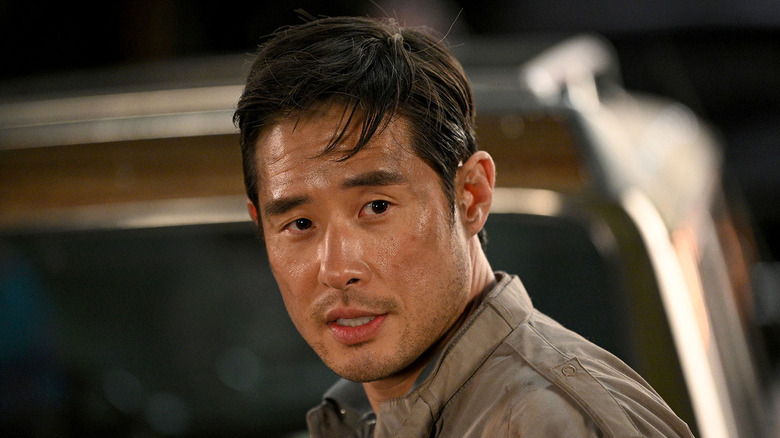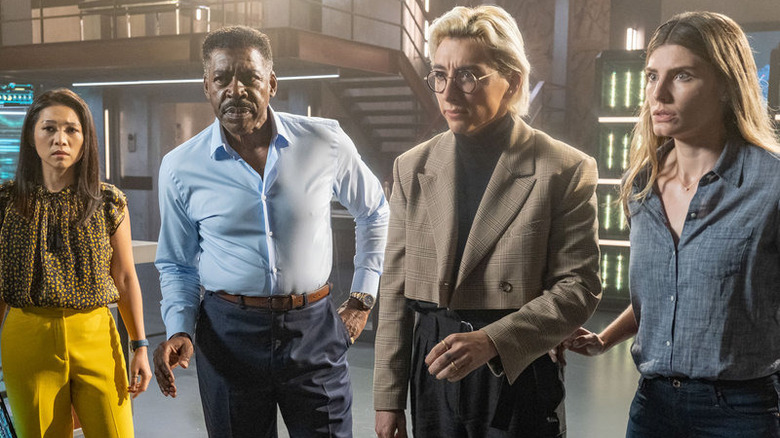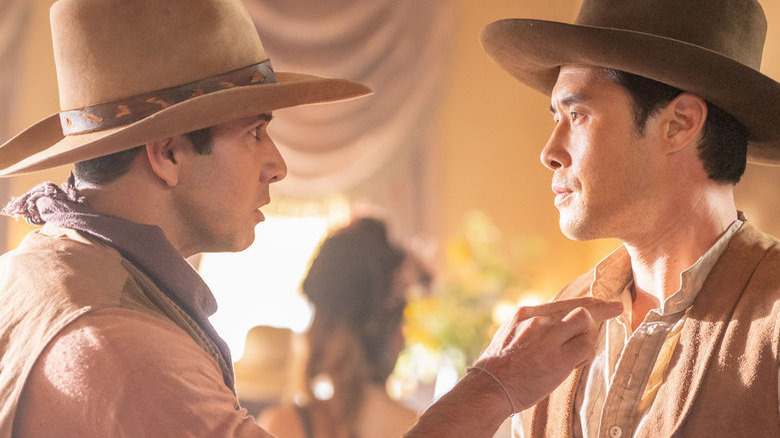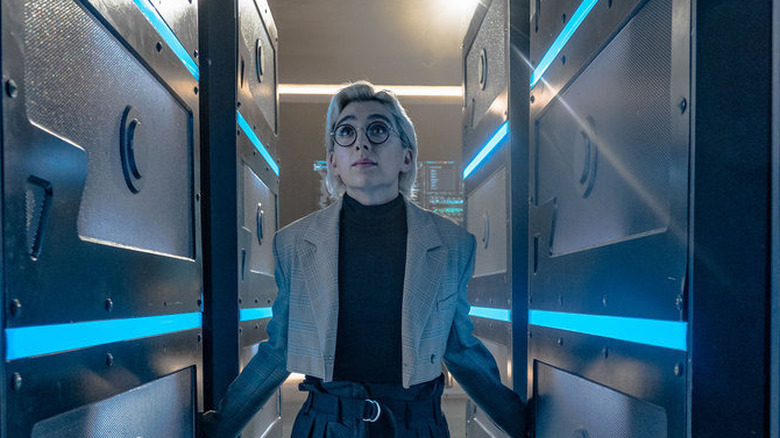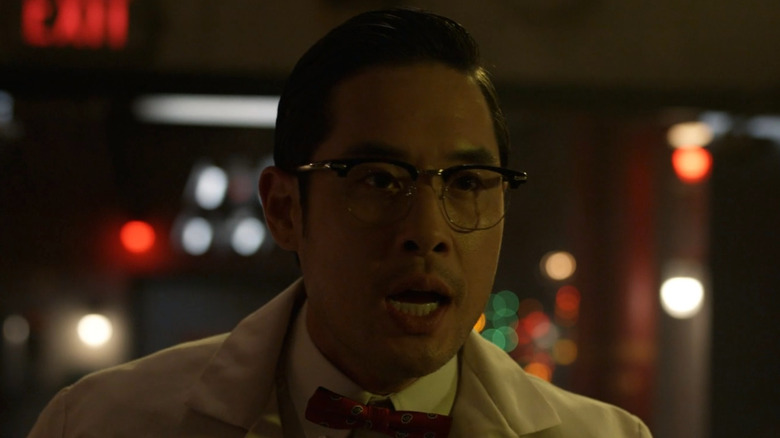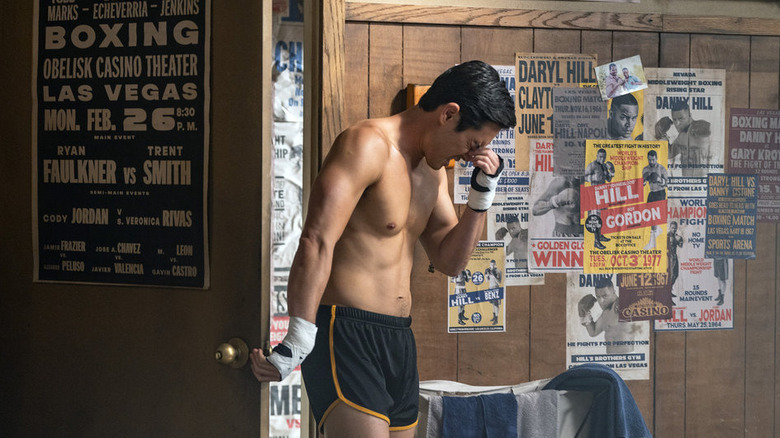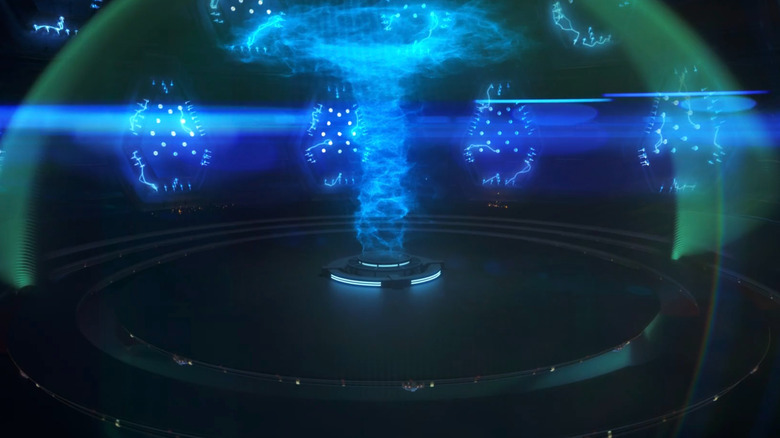The 6 Best And 6 Worst Moments Of The Quantum Leap Reboot
Theorizing that a cult classic show about altered timelines could find new life in the current TV landscape, writer-producers Steven Lilien and Bryan Wynbrandt took their "Quantum Leap" reboot idea to NBCUniversal and overcame the substantial odds against having a show idea picked up to pilot, much less a pilot ordered to series.
The result is something not quite trapped in the past, and not quite established as a show of its own yet, either. Luckily, their guide on this journey is original series creator and writer, executive producer Donald P. Bellisario, who lends legitimacy and approval to this new venture.
Some elements of the new "Quantum Leap" are clicking into place, while others aren't quite where they could be yet. In our estimation, these are the six best and six worst aspects of the show thus far. Any time travelers from the past who have not yet seen the first season should be aware there are spoilers ahead.
Best: Connections to the original series
It would be impossible to watch the new "Quantum Leap" without comparing it to the old one, and since some differences are inevitable, a few solid connections between the two accomplishes a great deal in the way of fan service and audience engagement.
Dean Stockwell's death in 2021 was a great loss to the film and television industry, and his portrayal of Al Calavicci — hologram to original leaper Sam (Scott Bakula) — was not only beloved, but it was also a keystone of the first series. Hence, bringing back actress Susan Diol in Season 1 Episode 2 as Al's first — and in this corrected history, only — wife Beth, touches the hearts of everyone who loved their romance.
Similarly, one of the core members of Project Quantum Leap (aka, the PQL team) has an intimate connection to the original series. As team leader Herbert "Magic" Williams, Ernie Hudson plays the future version of someone Sam leaped into in 1970 during the second part of "The Leap Home." As a result of the events of that episode, Magic feels incredibly beholden to Sam and Al.
There have also been Easter egg connections fans have delighted in spotting, such as Carly Pope as astronaut Samantha Stratton, daughter of the very first person Sam embodies. And the truly attentive may notice a pattern between Sam's early leaps and Ben's (Raymond Lee) current leaps. These small but notable references bring a lot of joy to the show for longtime fans.
Best: Nonbinary actor, nonbinary role
In the '90s, the most gender-bending character of the original "Quantum Leap" was Ziggy, the supercomputer who's generally referred to with masculine pronouns but was voiced by a woman (executive producer Deborah Pratt). Blessedly, this reboot has actually entered the new millennium with actor Mason Alexander Park in the role of computer smarty pants Ian Wright. Park is a renowned nonbinary performer of stage and screen, and their character on the show is also gender fluid.
In the episode "A Decent Proposal," Ben has his first experience in the body of a woman, and Ian laments their inability to tease him about this because they are busy working on a Ziggy problem. Ian's gender affiliation isn't a focal point of discussion because they're an essential part of the team, as well as a valued colleague and friend to the rest of PQL.
In the episode "Let Them Play," however, the issue of trans rights in schools comes to the forefront, and Ian is there to talk openly about how such positive reinforcement and representation makes life easier for LGBTQ kids. It's a positive, effortless portrayal of a nonbinary person out in the world, and it deserves a lot of acclaim.
Best: Good chemistry among the team members
The current reboot series of "Quantum Leap" has chosen to focus its narrative on the team back in Los Angeles working on the project, rather than the leaper himself with his foggy memories and in-leap experiences. It's not a bad formula; in fact, it provides a fresh perspective on the story. However, this approach requires a strong chemistry between core cast members. Thankfully, the team at Project Quantum Leap HQ gel superbly.
Magic brings exactly the right balance of authority figure energy and camaraderie, as well as reverence for the project that is needed to gain the admiration of the rest of the team. Jenn (Nanrisa Lee) is cool and maybe a little mysterious, but open with the people she trusts, even though she hates being vulnerable. Addison (Caitlin Bassett) is capable and assertive in her work, and just as fierce with her heart, making it easy to imagine her putting her life on the line for any of her friends. And Ian is generous, clever, loving, and willing to call people out even if they can have a hard time seeing their own issues. Together, these colleagues complement, support, and also challenge each other to do and be the best, for the project and for Ben, who's something of a wildcard as he bounces through time.
Best: Set in the present
Watching the original series now, parts of it feel extremely dated, but maybe not for all the reasons one might think. Of course, there are moments of and references to racial issues and racist terms that would not make the air today, but there's also the glaring problem of 1999, when Sam's "present" was set.
Looking like a game of "3D Tetris," the original Quantum Leap Project headquarters set was all colored cubes of blinking lights, yet 1999 was only a decade after the show's premiere, and every new season inched the series closer and closer to overtaking its own timeline. Now that 1999 has actually happened, those of us who were there know it looked absolutely nothing like the "1999" depicted in the original "Quantum Leap."
This new sequel series avoids that potential pitfall from the start, and instantly sends the series off on the right foot. Today's "Quantum Leap" is set in present-day Los Angeles, and that is a gift to both the creators and the audience. Just for a start, the look of houses, cars, neighborhoods, appliances, and countless other items that reside in the background of our lives continue to look the same on camera. The same goes for general technology, like phones, satellites, spacecraft, personal computers, security cameras, and so on. There's enough world building going on within the time travel project itself, there's no need to further complicate that by having to invent new forms of basic communication.
Best: Thinking four dimensionally
"Quantum Leap" is a time travel show, and time is the fourth dimension. According to Albert Einstein, to accurately tell someone where you are, you must also indicate when you are. Astrologers have followed this same concept in constructing natal birth charts and attempting to predict the future for thousands of years. That's why it's a spectacular move that "Quantum Leap," for the first time in its storied existence, finally incorporated a tangible path to and threat from the future.
In Episode 2, viewers and team members alike learn that Ben is on a targeted path of leaps — a previously unheard-of concept — in order to reach a specific point in the future, which by definition must have been fed to him by another unknown future entity. Then, in Episode 5, we learn there's a second leaper on Ben's tail who clearly has malicious intent, only in the present that second leaper is a young guy with no idea who Ben or any of the other project members are. It isn't until some point later in his life that he will become enraged with Project Quantum Leap and try to sabotage it.
This fourth-dimensional thinking opens up entirely new avenues of high stakes to propel the story forward and keep audiences eager for more. Even better, it prevents the show from getting mired in themes of the past.
Best: Evil Ziggy
The artificial intelligence at the heart of Project Quantum Leap has always had an ego even bigger than a room full of 1960s supercomputers, so it only makes sense that it's the evil genius pulling all the strings. Sentient AI taking over the world and attacking humans is a long-celebrated subgenre of science fiction, and this new "Quantum Leap" series would be remiss if it didn't join those ranks.
Ziggy's supposed to be the most advanced artificial intelligence system in existence, so surely it would find fault with the rather messy way humans continually fail through life. It would look down on our illogical pursuits, our fruitless ventures, and our indecisiveness. Ziggy would see what needed to be done, and Ziggy would do it without another thought. It all makes perfect sense.
The revelation, then, that Ziggy is not only the mole feeding information about the leaps to someone or someones in the future, but that Ziggy is at the heart of the Leaper X plot to destroy the project, is simply genius. Of course, Ziggy is still made up of code. It's entirely possible that there's a very real human still unseen who is taking advantage of Ziggy's programming for their own ends. Only a future season or two will reveal the truth.
Worst: An overreliance on the Evil Janis red herring
As early as Episode 2 of the new "Quantum Leap," Janis Calavicci (Georgina Reilly) — the youngest daughter of the finally reunited Beth and Al from the original series — is painted as a rogue operator acting outside of the law and sending Project Quantum Leap into an unexpected tailspin. Not only that, but she knocks out her own mother with some spiked tea, steals confidential files and technology, and blows up at least one building. That's major espionage for someone the audience has no connection to. Only, let's be real, the daughter of Al and Beth could not in all seriousness be a villain — not on this show — so we pretty much knew from the start that all her underhandedness must be a red herring.
The problem is with the team distrustful of Janis and their focus on figuring out her angles and motives, when Martinez (Water Perez) is identified as Leaper X, there's almost no room left to study him with this same fervor.
Martinez, it turns out, is crucial towards the success or failure of the project, as well as a mortal danger to at least one of the core team members. His motives should be both shocking and organic, meaning when the hammer drops on the reveal of his zealotry, a dozen tiny clues should slide into place like the pins of a combination lock lining up for a safecracker. That doesn't happen here. Martinez's denouement is fumbled short of the goal.
Worst: Less time with Ben
As the leaper, Ben is the lead of the new "Quantum Leap." While it's a nice switch-up to see the leap from the outside, the show shouldn't become about the outside, and the frequent overemphasis on problems cropping up in the project's present have unfortunately left the audience with less time with Ben.
The best part of "Quantum Leap" in the '90s was Bakula as Sam and the warmth he brought to his character by embodying the same personality each week, while also adjusting to the new life he was living in that episode. It's a show about time travel, but it's mostly a show about the human condition, fighting for what's right, bringing compassion into your relationships, and living with integrity. It's also fun. The inherent comedy of the show's fish-out-of-water premise carried the series into the hearts of its fans, and it's imperative the sequel series aligns more closely to that model with its upcoming second season. It's the leaping that's the draw, not the techs.
Dr. Ben Song is required to draw on his own personality and heart to connect with the lives he touches in his leaps. To do this, he also has to connect with viewers. Sam is a lawful good character; meanwhile, especially in the early goings, Ben is a chaotic neutral. He needs to loosen up and be vulnerable, and he's going to need heavy-hitting leaps to make viewers care about his fate.
Worst: Leaping outside Ben's lifetime
One of the fundamentals of quantum leaping, and of Sam Beckett's original string theory, is that a person can only leap within the boundaries of their own lifetime. So why does Ben leap into points in the past — the 1950s, the 1970s, the Old West — well before he was born?
Viewers who are new to the series probably wouldn't notice such details, but fans of the original were struck by it immediately. A throwaway suggestion of the removal of safety protocols from the otherwise genius Ian was never going to fly with superfans, and the itinerary of mapped leaps they study later in Episode 3 when Ben inexplicably leaps back to 1977 also makes very little sense. If Ben is bouncing around along the looped string of his own lifetime, then there are no other time periods available no matter how fast he does it.
Even if the acceleration sling-shot idea was viable, Ben would have to build up significant momentum within his leaps before he could achieve a time jump of that nature, so those leaps would have to have happened more toward the end of his journey, not the beginning.
It may seem like a meaningless plot point to get stuck on, but science fiction only works if the established rules are firm. Leaping to other points in time is great, but it has to be explained better than it has been thus far.
Worst: Needs more spark
The pilot episode of the new "Quantum Leap," introduces Ben Song and Addison Augustine at their engagement party, but that night Ben gets a text that sends him sneaking out to hijack PQL by taking an unauthorized step into the Accelerator. From that moment on, Ben and Addison are no longer a traditional couple. In fact, for his first few leaps, Ben isn't entirely sure what his relationship with Addison is, and Addison is hurt and confused as to why Ben would up and leave her this way without explanation.
The disconnect leaves their interactions somewhat stilted — even more than expected from a human-hologram situation — and their emotional connection obscured. It's not a question of chemistry, because some moments, particularly in the season finale, clearly showcase their spark. But most of the time they hold a more reserved dynamic.
This problem takes a big step toward being rectified in one episode, however, although not from a romantic moment. It was Episode 11, "Leap. Die. Repeat.," after Ben dies. The episode features a time loop, another area the original series never ventures into, and in it, Ben dies over and over as he fails to stop a nuclear reactor from exploding. His first death, though, is obviously the most powerful, and Caitlin Bassett produces an excellent display of grief and hysterical despondence at the loss Addison feels. In that moment, viewers feel the power of their love. They just need more of it.
Worst: No sense of whimsy
The original "Quantum Leap" is a drama, but it's also infused with a lot of goofball comedy. Be it Sam dressing like Carmen Miranda or any of Al's dozens of wildly mismatched and eccentric outfits, the first "Quantum Leap" likes to be silly, and that silliness magnifies the power of both the core duo's friendship and the stories Sam lives through his leaps.
If there's one thing the "Quantum Leap" sequel series needs, it's more whimsy. Right now, the show is banking on intrigue, and while that has its place, it needs more lightheartedness. It needs to embrace the innate absurdity of being in another person's body. If Ben can leap into the strength of a boxer, as he does in Episode 3, then maybe he should have phantom breast tenderness as a young woman. There should be a situation that the whole team can laugh about. Not every leap has to save the world.
In addition, the team back home should be having more fun. Addison pretty much has free reign in the Imaging Chamber, and as Ben's fiancée, she should know how to make him laugh. Plus, Ian clearly has sass for days and could serve it with more than just their wardrobe. Magic was the life of the party back in Vietnam, and definitely still holds a lot of that charm. As tough as Jenn is, she's got a wild side hidden away somewhere.
Worst: The finale pulled its punches
The final image of the new "Quantum Leap" Season 1 is the Accelerator preparing to accept a leaper as the PQL team awaits Ben's anticipated leap home. Before the leaper is revealed, however, the episode cuts to credits. There's no reveal at all, and the audience is left unfulfilled and perhaps indifferent.
It's the kind of move one might expect from a show still uncertain whether or not another season is in the future, but "Quantum Leap" had its Season 2 secured by December 2022, so there's really no excuse for a definitive leaper to not step out of the Accelerator and create either a cliffhanger or a shocking twist that fans will be talking about the entire off-season.
The absence of a leaper could be considered a cliffhanger, except immediately after the finale aired, the teaser trailer for "Quantum Leap" Season 2 was broadcast, revealing right away that Ben is, in fact, still leaping. So as far as the audience knows, the Accelerator simply powers down and no one steps out. And that would be a letdown for all involved.
The rest of the finale was serviceable if not perfect, but that last image should've been a huge moment as someone emerged from a leap. It could've been Ben, older Ben, a different member of the team entirely, a total stranger, or Dr. Sam Beckett himself. The show dropped the ball here and should've planned a much bigger season-ending punch.
